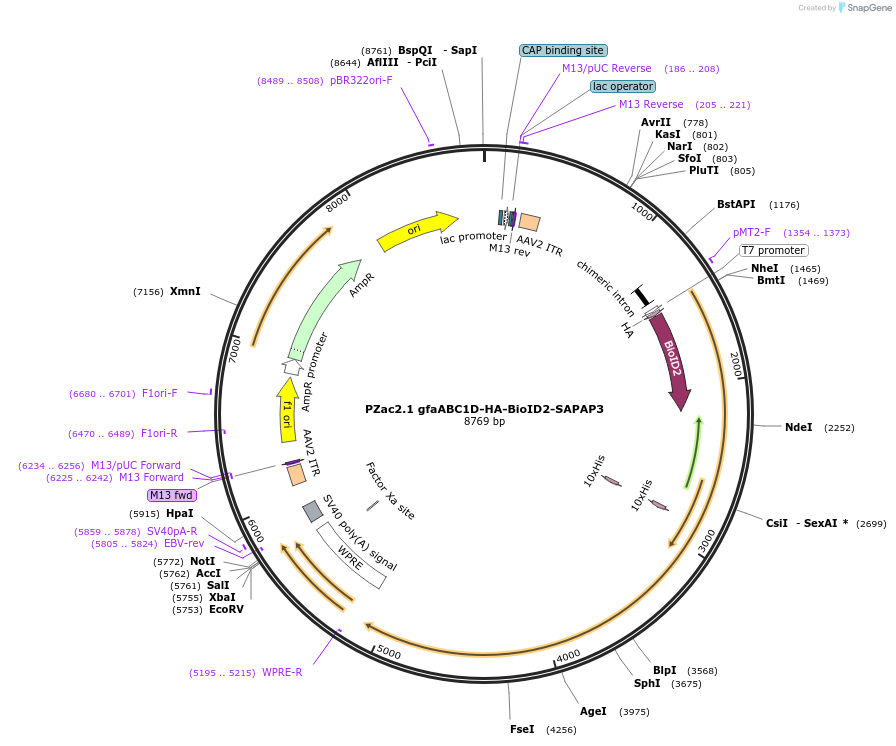PZac2.1 gfaABC1D-HA-BioID2-SAPAP3
(Plasmid
#176858)
-
PurposeExpresses SAPAP3 protein fused with BioID2 at the N-terminus in astrocytes
-
Depositing Lab
-
Sequence Information
Ordering
| Item | Catalog # | Description | Quantity | Price (USD) | |
|---|---|---|---|---|---|
| Plasmid | 176858 | Standard format: Plasmid sent in bacteria as agar stab | 1 | $89 | |
Backbone
-
Vector backbonePZac2.1
-
Backbone manufacturerKhakh lab
- Backbone size w/o insert (bp) 5085
- Total vector size (bp) 8769
-
Vector typeBacterial Expression, AAV
Growth in Bacteria
-
Bacterial Resistance(s)Ampicillin, 100 μg/mL
-
Growth Temperature37°C
-
Growth Strain(s)NEB Stable
-
Copy numberUnknown
Gene/Insert
-
Gene/Insert nameHA-BioID2-SAPAP3
-
Alt nameBioID2-SAPAP3
-
SpeciesM. musculus (mouse); Aquifex aeolicus
-
Insert Size (bp)3684
-
GenBank IDNM_198618.5
- Promoter gfaABC1D
-
Tag
/ Fusion Protein
- HA (N terminal on insert)
Cloning Information
- Cloning method Ligation Independent Cloning
- 5′ sequencing primer taatacgactcactatagg
- 3′ sequencing primer gtggtttgtccaaactcatc
- (Common Sequencing Primers)
Resource Information
-
Supplemental Documents
-
A portion of this plasmid was derived from a plasmid made byKyle Roux and Scott Soderling labs
Terms and Licenses
-
Academic/Nonprofit Terms
-
Industry Terms
- Not Available to Industry
Trademarks:
- Zeocin® is an InvivoGen trademark.
These plasmids were created by your colleagues. Please acknowledge the Principal Investigator, cite the article in which the plasmids were described, and include Addgene in the Materials and Methods of your future publications.
-
For your Materials & Methods section:
PZac2.1 gfaABC1D-HA-BioID2-SAPAP3 was a gift from Baljit Khakh (Addgene plasmid # 176858 ; http://n2t.net/addgene:176858 ; RRID:Addgene_176858) -
For your References section:
Astrocyte-neuron subproteomes and obsessive-compulsive disorder mechanisms. Soto JS, Jami-Alahmadi Y, Chacon J, Moye SL, Diaz-Castro B, Wohlschlegel JA, Khakh BS. Nature. 2023 Apr;616(7958):764-773. doi: 10.1038/s41586-023-05927-7. Epub 2023 Apr 12. 10.1038/s41586-023-05927-7 PubMed 37046092



